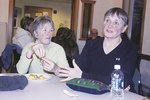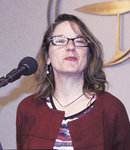People voiced concerns, but arrived at few answers Monday at the Quimper Unitarian Universalist Fellowship’s (QUUF) public conversation on what it means to be a “sanctuary community.”
After …
This item is available in full to subscribers.
We have recently launched a new and improved website. To continue reading, you will need to either log into your subscriber account, or purchase a new subscription.
If you had an active account on our previous website, then you have an account here. Simply reset your password to regain access to your account.
If you did not have an account on our previous website, but are a current print subscriber, click here to set up your website account.
Otherwise, click here to view your options for subscribing.
* Having trouble? Call our circulation department at 360-385-2900, or email our support.
Please log in to continue |
|



People voiced concerns, but arrived at few answers Monday at the Quimper Unitarian Universalist Fellowship’s (QUUF) public conversation on what it means to be a “sanctuary community.”
After the meeting, attendees were encouraged to send their comments via email to
citycouncil@cityofpt.us or to post them online, where the Port Townsend City Council also is to post the text of its draft resolution, prior to its Feb. 27 meeting, during which the resolution could be introduced for a vote. The meeting begins at 6:30 p.m., Monday, Feb. 27 in City Hall.
QUUF minister Bruce Bode set the tone at the meeting’s opening by describing the congregation’s values as respecting “the inherent dignity and worth of every person.” While he believes that President Trump’s stance on immigration violates these basic principles, he also asked the conversation’s participants to show the same respect to those who might not agree with their views.
Paul Heins, pastor of First Presbyterian Church and representing what Bode noted was “a sizable Presbyterian contingent” in the Unitarian church pews that Monday, echoed the call for dialogue across religious denominations.
“We need to share with passion and listen with compassion,” Heins said. “We need to be supple in compromise, but substantial enough to take a stand. Our conversational partners can’t just be those who already think like we do.”
ATTORNEY SPEAKS
The rest of the speakers were familiar faces to those who had attended previous community meetings about the sanctuary issue.
Immigration lawyer Annie Benson, second-generation Iranian-American Zhaleh Almaee and Guatemalan immigrant Liseth Marroquin all had spoken at the Port Townsend City Council workshop meeting Feb. 13 about declaring sanctuary city status.
Marroquin called attention to international policies of the United States that she blamed for destabilizing countries such as Guatemala and making the U.S. more appealing to the former residents of those countries.
“I love Guatemala,” Marroquin said. “I love its beautiful people and its abundant natural resources. But U.S. and Canadian companies have polluted our water and air, and the coup d’état of our democratically elected government by the CIA [in 1954] changed generations of our history.”
Marroquin expressed sympathy for Americans, whom she sees as now becoming victims of the same policies that their government has practiced abroad, and called upon them to stand together against a common foe.
Almaee cited the sacrifices made by her Iranian father in the name of becoming a successful American, and recalled being followed home from school by boys with rocks in their hands, yelling threats and ethnic slurs at her.
“My first thought was ‘Do they have the right person?’” Almaee said. “I was sure they must be talking about someone else.”
That moment of fear made Almaee want to reclaim her cultural heritage. She changed her birth name of “Emily” to better reflect her ethnicity, which she further embraced when she discovered her Jewish ancestry with the death of her grandfather.
“I may look like any other young, pretty white girl, but I know people who can’t take the risk of making themselves visible,” Almaee said. “These are people who, because of their status, can be put on a plane and have their whole lives taken from them in an instant.”
Almaee was disturbed by what she perceived as threatening comments at the Feb. 13 City Council meeting, as well as by hate mail she received after attending a “No Hate” rally, but she’s equally concerned for the plight of other Jews, as well as Muslims and LGBTQ people.
“As a mother, I’m desperate to find an example of a role model,” Almaee said. “Regardless of whether we call it a ‘welcoming city’ or a ‘sanctuary city,’ we need some measure that we can hold up for the next generation, so we can say, ‘We’re doing something, and there’s more that needs to be done, but this is a start.’”
‘OVERGROUND RAILROAD’
Benson summed up a history of “sanctuary policies” that predated Trump’s Jan. 25 travel ban executive order, starting with the “overground railroad” that faith communities in the 1980s provided to refugees from Guatemala and El Salvador, helping smuggle them into Canada to obtain asylum.
Benson added that 2008 saw a resurgence of the sanctuary movement, as deportations ramped up, law enforcement collaborated with the Border Patrol and Immigration & Customs Enforcement (ICE), and arrests of undocumented immigrants for non-immigration-related offenses saw jails becoming pipelines to deportation.
“In cities and counties across the country, they called upon law enforcement to stop collaborating with ICE and Border Patrol,” Benson said. “Law enforcement itself made clear that this collaboration was interfering with its mission of keeping people safe.”
Benson credited the Obama administration with pulling back from its previous escalation of deportations, and instead targeting “only the serious criminals” among the undocumented, but she sees Trump as having “really taken the gloves off” with his travel ban and targeting of sanctuary jurisdictions.
“It doesn’t matter to this administration whether we call ourselves a ‘sanctuary city’ or a ‘welcoming city,’” said Benson, who lives in Port Townsend. “What matters is what we do, and what we say we’re going to do.”
Benson noted that Port Townsend cannot stop federal authorities from rounding up and deporting undocumented immigrants, but it can take measures such as preventing any potential pipeline from the Jefferson County Jail to deportation.
“And the administration’s threats to cut off federal funding for our city are very limited in practice, so long as our policies are crafted to ensure that we don’t violate specific statutes,” Benson said.
Benson reported that roundups of undocumented immigrants have already started in Seattle, with expedited removal procedures in place.
NO LAWYERS
“About 85 percent of normal deportation cases don’t involve a lawyer, but the expedited removals will authorize officers to put these people on a plane with no due process, if they don’t have papers proving they’ve already been here between 90 days and two years,” Benson said. “Taking a stand is most important in rural communities like ours, because everyone expects big cities like Seattle to stand up.”
The afternoon’s small-group discussion period lasted only half an hour, and groups like Flossie Bode’s felt like they were just getting started when they were called back to the church pews.
“I’ve not always been politically active, but I’ve just had a visceral reaction to what’s been going on,” Bode said. “I’m trying to educate myself, because I don’t quite get all the implications of declaring ourselves a sanctuary city, but I want to stand on the side of love.”
Peg Hunter, a longtime political activist while living in Montana, moved to Port Townsend less than a year ago and was “stimulated” to become even more active by the Nov. 8 election results.
Ann Weaver is likewise new to the community, coming from Oregon, and recounted the experiences of undocumented immigrants she counts among her coworkers and friends.
“One of them no longer feels safe simply shopping at the grocery store,” Weaver said.
Elisabet Skyhawk said she has dealt with the glass ceiling her whole life as a woman, but before her time in Hawaii, she’d never faced any discrimination for the color of her skin.
“It informed my empathy and compassion,” said Skyhawk, who is white. “I want to join this battle because I don’t want anyone else to feel the way I did.”
In 2008, Katie Franco cofounded a group called “Border Patrol Free,” which informed undocumented immigrants of their rights. After the presidential election, she was “incredibly depressed,” but she and her friends set about contacting the Port Townsend City Council and the city police chief, as well as the Jefferson County commissioners and sheriff.
“There’s so much fear,” said Franco, whose fellow group members credited her with helping start the discussions about the city and county becoming sanctuary jurisdictions. “Mothers are afraid to pick their kids up at school.”
Flossie Bode’s group agreed that simple steps such as posting yard signs in support of undocumented immigrants are good first steps, with Weaver calling for them to “reclaim the American flag” by flying it next to those signs.
When the groups were called back to the church pews to share the results of their discussions, Franco talked about rumors she’d heard from Spanish-speaking friends, claiming that Border Patrol and ICE might stop cars at the Hood Canal Bridge.
“They tried this before,” City Council member Michelle Sandoval said of Border Patrol stops. “It ended in death, when a man who was stopped in Port Angeles ran into the forest, I believe with dogs chasing him, and dove into the river. Unfortunately, he didn’t know how to swim.”
Sandoval advised attendees to “know your cars and uniforms,” because the Border Patrol’s are not the same as those of police officers or sheriff’s deputies, nor do they possess the same powers of enforcement.
“If they have a warrant, they can go to your home and arrest you,” Sandoval said. “If they stop you at a checkpoint, you are not obligated to answer.”
While some attendees suggested organizing Facebook groups and email lists, Jason Victor Serinus advised caution, expressing concerns that databases of names could be used against activists by the authorities.